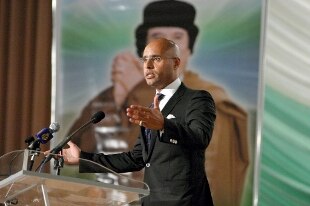Libya, the UN special envoy resigns surprisingly
Libya, Draghi: "We are moving towards simultaneous elections in December".
Then: "Unsustainable landings situation"
Libya, the international conference with Draghi, Merkel and Macron in Paris
Share
by Tiziana Di Giovannandrea
24 November 2021 The Libyan High Electoral Commission (Hnec) has announced that it has rejected the candidacy of Saif al-Islam Gaddafi, son of former leader Muammar, in the presidential elections scheduled for next 24 December. Saif Al-Islam, a descendant of the late Colonel Muammar Gaddafi, had presented his candidacy to Sebha and is one of the 25 candidates whose files have been rejected, according to a press release from the Libyan High Electoral Commission. The exclusion of Gaddafi jr, from the run-up to the presidential elections in Libya, was also announced by the satellite TV 'Al-Jazeera'. Saif al Islam is still wanted by the International Criminal Court (ICC) in The Hague for "crimes against humanity".
As regards the 98 candidates admitted, the Libyan High Electoral Commission, for further checks, will submit the candidacies to the scrutiny of the judiciary and an administrative authority. In recent days, Twitter had suspended Saif al Islam Gaddafi's account, 24 hours after its opening. The Libya Observer had given the news, adding that the reasons for the measure were not known. The account had reached 27,000 followers and contained only one tweet in which he urged Libyans to vote, declaring "The hour of truth has come".
Rejected candidates will be able to appeal to the judiciary. The Tripoli military prosecutor had asked for Gaddafi to be excluded in light of his conviction in absentia for war crimes in 2015.
Among the accepted applications are those of Haftar, Dbeibah, Saleh, Bashagha and Maitig
The candidacies of General Khalifa Haftar, Prime Minister Abdel Hamid Dbeibah and President of the Libyan Parliament Aqila Saleh in the presidential elections were accepted by the Libyan High Electoral Commission. Al Jazeera reported this in a tweet. The other major pan-Arab TV, Al Arabiya, also on Twitter underlined the acceptance of the candidacies of former Interior Minister Fathi Bashagha and former Deputy Prime Minister Ahmed Maitig. Predictably, appeals will also be presented against the two most prominent candidates: the acting interim prime minister, Abdul Hamid Dbeibah, and the general of Cyrenaica, Khalifa Haftar. The former had promised not to run for the presidency by accepting the role of head of the provisional government but did not resign three months before the vote as required by the electoral law.The second has US citizenship and this, according to his rivals, should exclude him from the electoral competition.
UN envoy: polarized political climate, not holding a vote would be worse
The political climate in Libya, one month after the expected date of the presidential elections, remains "heavily polarized" and the country remains in "a fragile and delicate situation on its path towards unity and stability through the ballot box". This is the alarm raised by the resigning UN envoy, Jan Kubis, during an intervention before the United Nations Security Council. Kubis stressed, "while the risks associated with the continuing political polarization around the elections are evident and present, not holding the elections could seriously deteriorate the situation in the country and lead to further division and conflict". Given the political and security transition in Libya, he further explained, due to "the delicate and complex electoral process",the need for a UN-mediated process has intensified.

